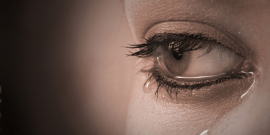Addiction/Substance Abuse
Although the term substance can refer to any physical matter, substance abuse has come to refer to the overindulgence in and dependence of a drug or other chemical leading to effects that are detrimental to the individual’s physical and mental health, or the welfare of others.
Anger Issues
Anger is an emotion. The physical effects of anger include increased heart rate, blood pressure, and levels of adrenaline and noradrenaline. Some view anger as part of the fight or flight brain response to the perceived threat of harm. Anger becomes the predominant feeling behaviorally, cognitively, and physiologically when a person makes the conscious choice to take action to immediately stop the threatening behavior of another outside force. CURE uses a anger workbook designed for teens to train and teach anger management principles.
Anxiety
Anxiety is a psychological and physiological state characterized by cognitive, somatic, emotional, and behavioral components. These components combine to create an unpleasant feeling that is typically associated with uneasiness, apprehension, fear, or worry.
Behavioral Home Contracts
Blended Family Challenges
Depression
Teen depression can be extremely intense at times because of physical and hormonal changes but emotional instability is part of adolescence. Their changing mind, body and relationships often present themselves as stressful and that change, they assume, is something to be feared.
Eating Disorders
An eating disorder is characterized by abnormal eating habits that may involve either insufficient or excessive food intake to the detriment of an individual’s physical and emotional health. The causes of eating disorders are complex and not yet fully understood.
Grief-Loss
Grief is a multi-faceted response to loss, particularly to the loss of someone or something to which a bond was formed. Although conventionally focused on the emotional response to loss, it also has physical, cognitive, behavioral, social, and philosophical dimensions.
Handicapped Counseling & Challenges
CURE Counseling & Assessment Training Centre is committed to working with people who are handicapped. Counseling and Life Coaching are viable options that may help further develop the current challenges of those who are handicapped. Life Coaching is a proactive approach that provides an opportunity to be more positive and develop new coping skills and new approaches to become the “best you can be” in the situation in which you find yourself. We have Josh Vanderbush on our CURE Team, who is a paraplegic. Josh works with Dr. Shaffer to provide ways to help handicapped people gain new perspectives and learn new insights that may enable them to re-direct their lives.
Oppositional Defiant Disorder
Oppositional Defiant Disorder is described as an ongoing pattern of disobedient, hostile and defiant behavior toward authority figures which goes beyond the bounds of normal childhood behavior. People who have it may appear very stubborn.
Personal Counseling
Personal counseling is an intentional interpersonal relationship to aid people in problems of living. It aims to increase the person’s sense of well-being and can be designed to meet the needs of each client as agreed on by the client and therapist. CURE Counseling strives to provide practical solutions to everyday challenges while encouraging the client to take responsibility for his/her counseling.
Post-Traumatic Stress Disorder
Post-Traumatic Stress Disorder is a severe anxiety disorder that can develop after exposure to any event which results in psychological trauma. This event may involve the threat of death to oneself or to someone else, or to one’s own or someone else’s physical, sexual, or psychological integrity, overwhelming the individual’s ability to cope. Children may develop PTSD symptoms by experiencing bullying or sexually traumatic events like age-inappropriate sexual experiences.
Procrastination
Procrastination refers to the counterproductive deferment of actions or tasks to a later time. Psychologists often cite such behavior as a mechanism for coping with the anxiety associated with starting or completing any task or decision. There are three criteria for a behavior to be classified as procrastination: it must be counterproductive, needless, and delaying.
Self-Esteem
Self-esteem is a term used in psychology to reflect a person’s overall evaluation or appraisal of his or her own worth. Self-esteem encompasses beliefs (for example, “I am competent” or “I am incompetent”) and emotions such as triumph, despair, pride and shame.
Self-Harm
Self-harm (SH) or deliberate self-harm (DSH) includes self-injury (SI) and self-poisoning and is defined as the intentional, direct injuring of body tissue without suicidal intent. The most common form of self-harm is skin cutting but self-harm also covers a wide range of behaviours including burning, scratching, banging or hitting body parts, interfering with wound healing, hair pulling (trichotillomania) and the ingestion of toxic substances or objects.
Separation Anxiety Disorder
Separation anxiety disorder is a psychological condition in which an individual experiences excessive anxiety regarding separation from home or from people to whom the individual has a strong emotional attachment (like a father and mother). It becomes a disorder when the separation reaction becomes strong enough to impair people’s ability to conduct their day to day lives and relationships.
Sexual Harrasment
Sexual harassment is intimidation, bullying or coercion of a sexual nature, or the unwelcome or inappropriate promise of rewards in exchange for sexual favors. In some contexts or circumstances, sexual harassment may be illegal. It includes a range of behavior from seemingly mild transgressions and annoyances to actual sexual abuse or sexual assault.
Shyness
In humans, shyness (also called diffidence) is a social psychology term used to describe the feeling of apprehension, lack of confidence, or awkwardness experienced when a person is in proximity to, approaching, or being approached by other people, especially in new situations or with unfamiliar people. Shyness may come from personality introversion, genetic traits, or the environment in which a person is raised..
Stress
Stress symptoms commonly include a state of alarm and adrenaline production, short-term resistance as a coping mechanism, and exhaustion, as well as irritability, muscular tension, inability to concentrate and a variety of physiological reactions such as headache and elevated heart rate.

















